new posts in all blogs
Viewing: Blog Posts Tagged with: The WORD Interview, Most Recent at Top [Help]
Results 1 - 10 of 10
How to use this Page
You are viewing the most recent posts tagged with the words: The WORD Interview in the JacketFlap blog reader. What is a tag? Think of a tag as a keyword or category label. Tags can both help you find posts on JacketFlap.com as well as provide an easy way for you to "remember" and classify posts for later recall. Try adding a tag yourself by clicking "Add a tag" below a post's header. Scroll down through the list of Recent Posts in the left column and click on a post title that sounds interesting. You can view all posts from a specific blog by clicking the Blog name in the right column, or you can click a 'More Posts from this Blog' link in any individual post.
 Lauren Grodstein’s second novel takes the family drama and turns it up a notch:
Lauren Grodstein’s second novel takes the family drama and turns it up a notch:
A skilled internist with a thriving practice in suburban New Jersey, Pete Dizinoff has a devoted wife, an impressive house, and a son, Alec, on whom he’s pinned all his hopes. But he never counted on the wild card: Laura, his best friend’s daughter—ten years older than Alec, irresistibly beautiful, with a past so shocking that it’s never spoken of…
Bouncing between the mundane and the creepifying, and blurring the lines between them, this novel is surprising and engaging, and we’re thrilled to offer you a behind-the-scenes look at A Friend of the Family.
WORD: The New York Times Book Review blurb describes the book as “Suspense worthy of Hitchcock.” Who/what were your influences during the writing process?
LAUREN GRODSTEIN: This might sound corny – okay, I’m sure it sounds corny – but I honestly felt like Richard Ford’s Independence Day held my hand throughout the writing of this novel. Whenever I felt stuck or lost, I opened to any page in that book, which I’ve always admired, and delved into the rich and idiosyncratic voice of Frank Bascombe, the protagonist. I especially liked the passages in the book where he’s trying to sell a problematic house to a problematic couple. Ford really let himself go when he was writing these scenes, indulged in long descriptions, rounds and rounds of dialogue, and to me it all works beautifully. So I used those chapters to give myself license to try to do similar things, explore the workplace environment a little bit, place one chatty scene after another.
W: In the “Short Note from the Author” at the end of the book, you talk about getting into the mindset of Pete (the narrator). Personally, I’m curious about what it was like to get into Laura’s head — she was a character I found unnerving and terrifying, but also creepily sympathetic.
LG: In order to moderate or complicate Laura’s evilness (is that a word? Evility? Evilitude?) I tried to give her certain characteristics that were very similar to my own – our names are similar, for instance, and we’re the same age, and we both grew up and went to high school in northern New Jersey. I think by keeping her experiences close, in certain ways, to my own, I was able to keep her from being a cartoonishly horrible person. I empathized with her, and I knew her very well. And when you know someone well and empathize with her it’s hard not to see her in three dimensions, even if two of those dimensions are pretty horrible.
W: What do you think of the cover? It features an extreme close-up of a young woman, presumably Laura, rather than a man like Pete or a family shot, which would also be appropriate.
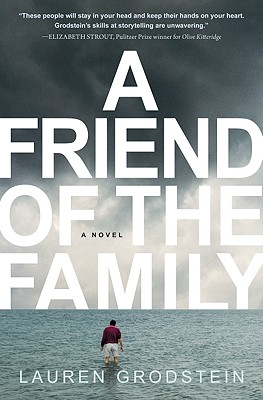 LG: I really love it. But I also loved the first cover, the hardcover jacket, which depicts a man wading into an ocean, looking for all the world like he’s about to go in over his head. It’s a metaphoric cover but I think it works really nicely.
LG: I really love it. But I also loved the first cover, the hardcover jacket, which depicts a man wading into an ocean, looking for all the world like he’s about to go in over his head. It’s a metaphoric cover but I think it works really nicely.
W: The novel revolves around the choices parents make in order to protect their children. You’re a parent yourself — how did your own relationship with your c
In the late 1880s, Frank Lenz of Pittsburgh, a renowned high-wheel racer and long-distance tourist, dreamed of cycling around the world. He finally got his chance by recasting himself as a champion of the downsized “safety-bicycle” with inflatable tires, the forerunner of the modern road bike that was about to become wildly popular. In the spring of 1892 he quit his accounting job and gamely set out west to cover twenty thousand miles over three continents as a correspondent for Outing magazine. Two years later, after having survived countless near disasters and unimaginable hardships, he approached Europe for the final leg. He never made it. His mysterious disappearance in eastern Turkey sparked an international outcry and compelled Outing to send William Sachtleben, another larger-than-life cyclist, on Lenz’s trail.
David Herlihy, author of The Lost Cyclist and chronicler of Lenz and Sachtleben’s amazing story, dishes with us on the writing process, bicycling then and now, and more.
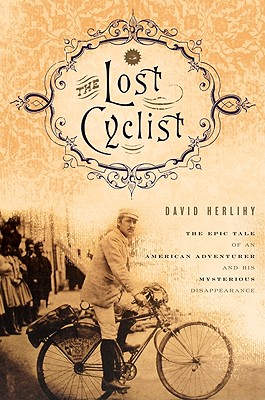
WORD: How did you first learn about Frank Lenz and his disappearance?
DAVID HERLIHY: It’s been about 20 years since I first delved into bicycle history. I began to read cycling literature from the 1890s, and would often come across the name of Lenz. He was something of cycling celebrity even before he embarked on his world tour in 1892, having completed several long distance rides on a high-wheeler with his pal Charles Petticord. And of course he became a national figure once he began his round-the-world journey in May 1892. He became an international figure two years later when he disappeared in Turkey.
W: What was the most surprising thing you learned during the research for the book?
DH: I was surprised at how much information turned up, not only about Lenz but also about the book’s second major character, William Sachtleben. When I first contemplated writing a book on Lenz, I wasn’t sure if I could find much beyond his own published reports in Outing magazine. But, in large part thanks to the Internet, I was able to turn up a great deal of new information, including dozens of unpublished photographs taken by Lenz before and during his world tour, and important materials relating to Sachtleben as well.
W: How do you think the interest in cycling of the late 1800s, when it was still a novelty, compares to our interest today in, say, the Tour de France and Lance Armstrong?
DH: There are some parallels. Cycling was a very new proposition to the millions of Americans who took to the wheel in the1890s, thanks to the introduction of the pneumatic safety bicycle. True, the highwheel sport had already been around
for at least a dozen years, but it appealed almost exclusively to athletic young men of certain means who were willing to mount the thing and take a few spills. Many Americans today are re-discovering the joys of cycling, and realizing that it’s not just for kids, and that it can, in fact, provide very practical and economical transportation under certain circumstances.
One might even draw a parallel between Lenz and Lance. Lenz helped bring the new safety bicycle to the attention of the American public by embarking on his tour, while Lance certainly did much to publicize the sport to the American public, which may indeed have helped to spark a renewed interest in cycling. On a personal level, they both came from broken homes and turned to cycling as a “way out.”
W: The book includes photos taken both of and by the two c
 Our next YA Not? event is this Thursday night (July 31, 7:30 pm) with Sheba Karim, the author of Skunk Girl, which has been praised as a welcome addition to teen collections, providing a rare exploration of Muslim culture. Sheba will read from the book, and participate in a Q&A with Abeer Hoque.
Our next YA Not? event is this Thursday night (July 31, 7:30 pm) with Sheba Karim, the author of Skunk Girl, which has been praised as a welcome addition to teen collections, providing a rare exploration of Muslim culture. Sheba will read from the book, and participate in a Q&A with Abeer Hoque.
The YA NOT? series seeks to bring YA writers, editors, librarians, teachers, and other not-so-young adults who love teen fiction all together to talk about fantastic YA books, why we love them, and how we can spread them as far as possible. (Teens welcome too, of course!)
Here’s our short interview with Sheba:
1) Do you have a favorite WORD?
I like the Urdu word “baghawat,” which means rebellion. I use the word “just” all the time in my writing so there’s something about it I must really like.
2) What WORDS do you live by?
Eat, drink, be merry, and do some good along the way.
3) What was the last book you read?
In Cold Blood by Truman Capote
4) Any idea what you’ll read next?
Either a historical fiction novel set in India or Twilight.
5) What is the last book you bought someone as a gift?
A biography of Prophet Muhammad written by Karen Armstrong
 6) Can you name one author or book that was influential in writing Skunk Girl?
6) Can you name one author or book that was influential in writing Skunk Girl?
Judy Blume, definitely. My book could have just as easily been called Are You There, God? It’s Me, Nina.
7) What are you working on now – anything you can tell share about your next project(s)?
I’m working on a historical fiction novel set in 13th century Delhi.
8) Do you have a favorite spot in Greenpoint (or Brooklyn) that you’d like to share with us?
Watching summer concerts at the bandshell in Prospect Park.
Learn more about Sheba and the book at her website.
(Photo credit: Anjali Bhargava)






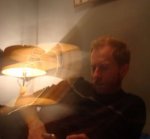 This Thursday, July 9th, we’ll host an Indie Press Night with Seven Stories Press. Greenpoint resident Douglas A. Martin will read from his brand new novel, Once You Go Back, about the children of a transplanted working-class family dealing with violence, their own budding sexuality, and the strain of a home breaking apart. He’ll be joined by Lee Stringer, author of Sleepaway School, and the event will be moderated by Phong Bui from The Brooklyn Rail. Additional information about the event can be found on our events page and on Seven Stories website. Here’s Martin’s short Q&A with WORD:
This Thursday, July 9th, we’ll host an Indie Press Night with Seven Stories Press. Greenpoint resident Douglas A. Martin will read from his brand new novel, Once You Go Back, about the children of a transplanted working-class family dealing with violence, their own budding sexuality, and the strain of a home breaking apart. He’ll be joined by Lee Stringer, author of Sleepaway School, and the event will be moderated by Phong Bui from The Brooklyn Rail. Additional information about the event can be found on our events page and on Seven Stories website. Here’s Martin’s short Q&A with WORD:
1) Do you have a favorite WORD?
Probably it’s burr, aesthetically, though I also like lure and thrush quite a bit for reasons more aural.
2) What WORDS do you live by?
Most practically: those of my students.
3) What was the last book you read?
I’m always in the midst of two or three things, usually starting another before finishing something up. Sarah Manguso’s The Two Kinds of Decay was the last I saw to the end.
4) Any idea what you’ll read next?
I’ll probably finally wrap up Reading Boyishly by Carol Mavor, which I’ve been pecking at for over a year, or complete Cesar Aira’s Ghost. Rebecca Brown’s American Romances will be the next thing I start.
5) What is the last book you bought someone as a gift?
I think it’s a gift for the author to buy their book when you go to a reading, so Life As We Show It, edited by Masha Tupitsyn and Brian Pera. That was at Housing Works, Soho.
 6) Can you name one author or book that was influential in writing Once You Go Back?
6) Can you name one author or book that was influential in writing Once You Go Back?
Sleep Has His House by Anna Kavan was the model for my earliest draft.
7) What are you working on now – anything you can tell share about your next project(s)?
I’m beginning the process of trying to publish my dissertation, on the writings of Kathy Acker. In July and August, while school is still out, I hope to finish up a manuscript of a book I’ve been struggling with the voice and ethics of on and off for about eight years now I guess.
8) Do you have a favorite spot in the neighborhood that you can tell us about?
I’ve lived in Greenpoint for nearing a year. It’s the first time I’ve ever shared a place with a partner. Paloma was a favorite restaurant, until the fire. We’re hoping it will be able to reopen.






 Ok folks, here’s the WORD from us today: We are having as awesome event this Thursday night – you should come. Seriously. No excuses.
Ok folks, here’s the WORD from us today: We are having as awesome event this Thursday night – you should come. Seriously. No excuses.
Here’s the scoop on what we’re calling our night of Sangria, Sorbet & TROUBLE!
Acclaimed author and WORD friend Kate Christensen will be here to read from her new novel TROUBLE, a vibrant story of female friendship and midlife sexual awakening that takes place in NYC and Mexico City — a great summer read! Bonus special guest, literary diva Maud Newton, will join Kate for a discussion about the book. And the very best part? You can listen to the reading and conversation while sipping sangria and sampling a variety of snacks from local vendors – salsa & chips, sangria sorbet and Mexican chocolate cookies. (Local businesses working with us include Dandelion Wine, The Brooklyn Salsa Company & Wine Cellar Sorbets; plus we’re making the cookies from a recipe in Sarah Magid’s new book Organic & Chic – that we had an event for last week)
You can RSVP for the event on our Facebook page. Please do! We hope to see you this Thursday, June 18th - refreshments start at 7:30, reading & conversation begin at 8:00 with book signing to follow. It’s going to be fabulous, we hope you can join us.

Until then, learn a bit more about Kate in this short WORD Interview we did with her. She shares info about her next novel, which just happens to take place in a building located right here in Greenpoint.
1) Do you have a favorite WORD?
An ever-shifting tide of them. This morning’s pet word is LAPIDARY.
2) What WORDS do you live by?
“Let nothing human be foreign to me.”
3) What was the last book you read?
I’m in the middle of G.K. Chesterton’s THE MAN WHO WAS THURSDAY.
4) Any idea what you’ll read next?
DON QUIXOTE
5) What is the last book you bought someone as a gift?
I bought Julie Klam’s PLEASE EXCUSE MY DAUGHTER for my sister.
6) What are you working on now – anything you can tell share about your next project?
My next novel is called THE ASTRAL — yes, that Astral, the huge red ghetto castle on India Street. It’s about a 57-year-old male poet whose wife of 30 years has booted him out of their Astral apartment for writing love sonnets to imaginary women (she doesn’t buy the imaginary part). Their son is in a mind-control cult and is about to marry the female leader; Harry tries to rescue him in order to win his wife back, but of course nothing goes as planned…
7) We know you live in the neighborhood, do you have a favorite spot in Greenpoint that you can tell us about?
Besides WORD? I love McGolrick Park. It feels like a beautiful old Eastern European park tucked into North Brooklyn.






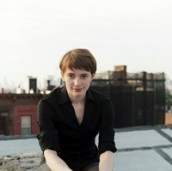
We’re very excited to be hosting the launch party for Emily St. John Mandel’s debut novel, Last Night in Montreal, a story of “…love, amnesia, compulsive travel, the depths and the limits of family bonds, and the nature of obsession.” Emily will be at the store tomorrow, Tuesday, June 2 at 7:30 pm for a reading and signing. We caught up with her for a quick Q&A before the event:
1) Do you have a favorite WORD?
I fall in love with words in serial fashion, but I think my latest favorite word is susurration. It’s one of those fantastic words that you just don’t get to use very often.
2) What WORDS do you live by?
There’s a line I like from Anne Michaels’ debut novel, Fugitive Pieces: “Find a way to make beauty necessary; find a way to make necessity beautiful.”
3) What was the last book you read?
Wake Up, Sir! by Jonathan Ames. (Purchased, incidentally, at WORD.)
4) Any idea what you’ll read next?
I think the next book I read will be Jonathan Lethem’s Motherless Brooklyn. I loved The Fortress of Solitude, but aside from short stories in the New Yorker I haven’t read his other work.
5) What is the last book you bought someone as a gift?
Tales from Outer Suburbia, by Shaun Tan.
At BookCourt, a lovely independent bookstore on Court Street in Carroll Gardens.
7) What are you working on now – anything you can tell share about your next project(s)?
I’m very happy to report that I recently sold my second novel to Unbridled Books — The Singer’s Gun will come out sometime in 2010. I’m working on one last round of revisions. I’ve also started writing the third novel, but only barely.
8) Do you have a favorite spot in Greenpoint?
Yes. WORD. And I swear I’m not just saying that because you’re hosting my book launch.
(We’re blushing…thanks Emily!)






John Wray, author of the popular and much praised new novel,
Lowboy, appeared at our store earlier this month. He did a short interview with us before the main event, but some how we never got around to posting it. Last night’s event author, Joanna Rakoff,
mentioned in her WORD Interview that she plans to read
Lowboy soon (you should too!) That reminded us to get this short Wray Q&A up and out there for ya all. So here is is:
1) Do you have a favorite WORD?
Currently, my favorite word is ‘lumbago’. I don’t know exactly why. I don’t suffer from lumbago myself, or know anyone who does. Does lumbago even exist anymore?
2) What WORDS do you live by?
I guess you could say I live my all words (or at least all English words) in equal measure, since without them I’d be out of a job. As far as ‘words to live by’ go, I’ve always been partial to this Iroquois saying: “If you sit long enough by the banks of the river, the corpses of your enemies will eventually float by.”
3) What was the last book you read?
The last book I read was ‘In Praise of Leisure’, by Bertrand Russell. Highly recommended.
4) Any idea what you’ll read next?
I’m about to start reading ‘Pretty Monsters’ by Kelly Link.
5) What is the last book you bought someone as a gift?
The last book I bought someone as a gift was ‘Then We Came To The End’ by Joshua Ferris.
6) Where did you buy it?
I bought it in Penn Station, about three and a half minutes before my train pulled out. It turns out that three and a half minutes is not, in fact, enough time to board that particular train from that particular bookstore.
7) What are you working on now – anything you can tell share about your next project(s)?
I’ve just started a big fat book about a family of crackpot physicists. I’m thinking of calling it “A Not-So-Brief History of Time”, but maybe that’s not such a good idea.
8) Do you have a favorite spot in Greenpoint?
My favorite spot in Greenpoint is probably my friend Chris’ apartment. He has a ping pong table in his kitchen.






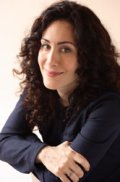 WORD is excited to welcome Joanna Smith Rakoff to the store tonight, May 19 at 7:30 pm. Joanna will be reading from her debut novel, A Fortunate Age, which details the lives of a group of Oberlin graduates whose ambitions and friendships threaten to unravel as they chase their dreams and build their lives in Brooklyn during the late 1990s. Jami Attenberg, author of The Kept Man will interview Joanna about the new book.
WORD is excited to welcome Joanna Smith Rakoff to the store tonight, May 19 at 7:30 pm. Joanna will be reading from her debut novel, A Fortunate Age, which details the lives of a group of Oberlin graduates whose ambitions and friendships threaten to unravel as they chase their dreams and build their lives in Brooklyn during the late 1990s. Jami Attenberg, author of The Kept Man will interview Joanna about the new book.
We did a little pre-event interview of our own with Joanna. Her answers to our grueling questions (otherwise known as The WORD Interview) can be found below – enjoy! And hope to see some of you at the store tonight!
1) Do you have a favorite WORD?
I have so many favorite words that it’s hard to choose just one. Lately, I’ve been loving “bereft,” which Jean Hanff Korelitz uses to great affect in both her new novel, Admission, and her 2004 novel, The White Rose. I suppose what attracts me to this particular word — as well as other favorites — is the way the sound of it mirrors the meaning. To be bereft, in my mind, is to be swept clean with sadness.
2) What WORDS do you live by?
If you’re asking which words I’m guilty of overusing, well, I’m afraid the answer is seriously banal: I’m always having to stop myself from saying “like” and “you know.” But I’m also prone to using silly modifiers to lessen the impact of my opinions or pronouncements: “sort of,” “semi-,” “kind of,” “a bit.”
If you’re asking whether or not I have a motto (or suchlike), I don’t.
3) What was the last book you read?
The aforementioned Admission, by Jean Hanff Korelitz, which has struck awe in me. The sheer force of her language — reminiscent of George Eliot — held me in thrall. And she’s just a great storyteller.
4) Any idea what you’ll read next?
John Wray’s novel Lowboy, followed by Robin Romm’s memoir The Mercy Papers.
5) What is the last book you bought someone as a gift?
Either Kate Atkinson’s genre-busting mystery Case Histories or Joshua Ferris’ Then We Came to the End. I’ve given both of these to numerous people as gifts, as they’re two of my favorites of recent years.
6) Where did you buy them?
McNally-Jackson, on Prince Street, in Nolita. It’s the closest general bookstore to my apartment, other than Bluestockings, a feminist bookshop, and the Tenement Museum store, which specializes in books about New York. I buy what I can at the latter two, but they often don’t have what I need, so I do much of my shopping at McNally-Jackson.
7) What are you working on now – anything you can tell share about your next project(s)?
Right now, I’m working on some essays, both critical and personal, and some short stories, which are basically a tool to help me figure out the scope of my next novel, which will, it looks like, be about American expats in Berlin and North Africa.
8) Have you been to Greenpoint before? Do you have a favorite spot in this neighborhood?
I used to live in Williamsburg, back in the day, and regularly walked up to Greenpoint to run errands and eat pierogi (this was ten years ago, when it was easier to, say, buy a frying pan in Greenpoint than in Williamsburg). My favorite place was the little soda shop at the edge of McCarren Park, where you could get egg creams and sodas made from flavored syrup and not-very-good hot dogs, and which was largely populated with elderly men of indeterminate ethnicity and loud teenagers drinking milkshakes. I’m not sure if it’s still there!
(Ed. note – Thanks Joanna! We think you might be referring to a luncheonette on Driggs that used to be an old-fashioned soda shop kind of place. Unfortunately, not anymore!)






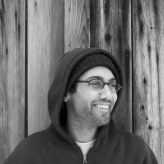 This Wednesday night, we will host our next Indie Press Night with with Soft Skull Press. We’ll hear from two writers with books recently published by Soft Skull: Zachary Mexico (China Underground) and Pasha Malla (The Withdrawal Method).
This Wednesday night, we will host our next Indie Press Night with with Soft Skull Press. We’ll hear from two writers with books recently published by Soft Skull: Zachary Mexico (China Underground) and Pasha Malla (The Withdrawal Method).
Pasha, who has written for Nerve and Salon among other publications, has written a collection of short stories in The Withdrawal Method that have been praised as “splendidly creative” (among other glowing reviews.) He recently took time out to answer some questions for us, and did splendidly with that as well!
Read on to see what Pasha said in his WORD Interview with us — and be sure to stop by the store Wed., April 29 at 7:30 to hear him and Zachary read from their new books!
1) Do you have a favorite WORD?
Cahoots!
2) What WORDS do you live by?
None in particular, although I really like this (from WB Yeats’s introduction to Pound’s book about Japanese theater): “I love all the arts that can still remind me of their origin among the common people, and my ears are only comfortable when the singer sings as if mere speech had taken fire, when he appears to have passed into song almost imperceptibly. I am bored and wretched … when he seems no longer a human being but an invention of science.”
3) What was the last book you read?
Just this morning I finished Jean-Phillipe Toussaint’s The Bathroom, which was okay, and Javier Marias’s Dark Back of Time, which blew my mind. (That probably sounds impressive but I only had like 6 pages left in each; I’m a pretty slow reader.) Oh, and yesterday on the subway I read Zachary Schomberg’s collection of poems, The Man Suit — so awesome!
4) Any idea what you’ll read next?
My friend John Goldbach’s new story collection, Selected Blackouts, and Lewis Mumford’s The Culture of Cities. Before bed I’ve been working my way through some Grace Paley stories and really digging them.
5) What is the last book you bought someone as a gift?
Brighton Rock, by Graham Greene, for my friend Kevin. It’s one of my favorites.
6) Where did you buy it?
The Strand — is that a wrong answer? Going there was his idea, I swear.
7) Do you have a favorite spot in Greenpoint?
Whatever bar I go to with my friend Tom. I forget the name, but if aliens were dropped onto the planet and you wanted to show them what the word “bar” mean, this is the place: no frills, just a bar, some spots to sit, good beers, hoops on the TV, and friendly folks.
8) We read that you like basketball a lot. Do you have any pointers (or reading suggestions) for participants of the upcoming inaugural season of the WORD basketball league?
Yeah, go play pick-up with teenagers at the Tillary Street courts in downtown Brooklyn! These kids have the time of their lives every weekend; you can learn a lot from how much they enjoy the game, even when they’re making you look stupid. And as for reading, check out FreeDarko’s new(ish) Macrophenomenal Pro Basketball Almanac — very fun. How do I join your league?
Ed. notes: We have the FreeDarko book in stock, as well as copies of Pasha and Zachary’s books. Our book-lovers basketball league is already full for this summer, but we expect to start an “honorary authors” membership!






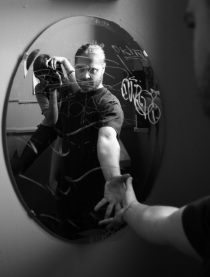 Writer and conceptual artist Rick Reid will be appearing at WORD tonight (April 14) at 7:30 pm, for the launch of his new poetry collection to be hung from the ceiling by strings of varying length. (Akashic)
Writer and conceptual artist Rick Reid will be appearing at WORD tonight (April 14) at 7:30 pm, for the launch of his new poetry collection to be hung from the ceiling by strings of varying length. (Akashic)
Since it’s National Poetry Month, we thought we’d ask Rick a few questions about poets and other authors or titles that inspire him. We decided to ask him a few other questions too, as part of our inaugural WORD Interview. (In the future, look for more official WORD interviews with guests who will be appearing at the store.)
Read on to learn about Rick’s “apocalyptic” book-buying spree, his fondness for Gertrude Stein’s poetry and his favorite spot in Greenpoint:
1) Besides launching your new book during National Poetry Month, how are you celebrating poetry during April?
Writing and reading like last month.
2) Can you share with us the names of some poets that have inspired you?
The writer I always return to – and who had a sharp influence upon Strings – is Gertrude Stein – in particular her ‘more obscure’ and ‘difficult’ texts such as Stanzas in Meditation and The Making of Americans. Stein said that The Making of Americans was to present “not only every possible kind of human being, but every possible kind of pairs of human beings and every possible threes and fours and fives of human beings”—such that, conceptually, the ‘impossibility’ of writing becomes the writing itself. Beyond that, the ‘impossible’ work of Joyce’s Finnegan’s Wake, the Oulipo group, Lawrence Weiner, and contemporary writers Kenneth Goldsmith, Christian Bök and Shanxing Wang are always in orbit.
3) What was the last book you read?
Well, the book I am currently reading is Guy Debord by Anselm Jappe. I spend far more time in worlds theoretical and philosophical—as well as art historical—rather than poetic to exist within the indistinct processes of these categories and discover injunctions within the masks of each. Thus, my interest in the Situationists and Guy Debord is based in the possibility of realizing a theoretical praxis, or, an applied philosophy—in some cases within the act of writing beyond narrative and description—which tend to keep us comfortable, contemplative and distant—and writing, instead, toward a more critical and active communication.
4) Any idea what you’ll read next?
There’s some vague plans to have a kind of ‘evolution and supersession of Marx’ reading group with fellow artists and friends this summer. Actually, they don’t know about this yet. But finally reading Das Kapital in its entirety sounds like a good start to spring cleaning.
5) What is your favorite(s) book of all time?
I don’t know favorites, but the first book that came to mind was Stein’s Stanzas in Meditation—read aloud.
6) What was the last book you bought someone as a gift?
Over the winter holiday I bought one ‘apocalyptic’ book for everyone in my immediate family—somewhat keeping their individual dispositions in mind. So there were the essential apocalyptic classics of Orwell’s 1984, Huxley’s Brave New World as well as Hesse’s The Glass Bead Game, Butler’s Erewhon, Rand’s Anthem and Gibson’s Neuromancer among others. What book matches with whom, is, well, for anyone to decide.
7) Where did you buy these gift books?
I made the ‘apocalyptic’ sweep at the Strand Annex. However, I just did pick up Deleuze and Guattari’s Anti-Oedipus: Capitalism and Schizophrenia at The Salvation Army on Manhattan Ave. for about two bucks. You never know what treasures await you between the spines of travel guides and Louis L’Amour novels.
8) Do you have a favorite WORD?
No. But a couple days back I overheard a clerk say to a fellow clerk at a photography store say, “I have no fear of heights whatsoever. And I live alone”—which hasn’t left my mind yet and will inevitably be a part of my next work.
9) What WORDS do you live by?
“If it can be done, why do it?” Stein again.
10) Have you ever been to Greenpoint? If so, have any favorite neighborhood destinations to tell us about?
I actually live in Greenpoint right up the street and down a block from WORD, so this neighborhood is the site for nearly all of my adventures. The ‘destination’ that stands out the most to me since I’ve been here is the “Java River Spot” which is just a dead end of the street into the East River. I’m pretty sure it’s the finest and most exclusive beach in Greenpoint.






 Lauren Grodstein’s second novel takes the family drama and turns it up a notch:
Lauren Grodstein’s second novel takes the family drama and turns it up a notch: LG: I really love it. But I also loved the first cover, the hardcover jacket, which depicts a man wading into an ocean, looking for all the world like he’s about to go in over his head. It’s a metaphoric cover but I think it works really nicely.
LG: I really love it. But I also loved the first cover, the hardcover jacket, which depicts a man wading into an ocean, looking for all the world like he’s about to go in over his head. It’s a metaphoric cover but I think it works really nicely.



 Our next YA Not? event is this Thursday night (July 31, 7:30 pm) with Sheba Karim, the author of Skunk Girl, which has been praised as a welcome addition to teen collections, providing a rare exploration of Muslim culture. Sheba will read from the book, and participate in a Q&A with Abeer Hoque.
Our next YA Not? event is this Thursday night (July 31, 7:30 pm) with Sheba Karim, the author of Skunk Girl, which has been praised as a welcome addition to teen collections, providing a rare exploration of Muslim culture. Sheba will read from the book, and participate in a Q&A with Abeer Hoque. 6) Can you name one author or book that was influential in writing Skunk Girl?
6) Can you name one author or book that was influential in writing Skunk Girl?
 This Thursday, July 9th, we’ll host an Indie Press Night with
This Thursday, July 9th, we’ll host an Indie Press Night with  6) Can you name one author or book that was influential in writing Once You Go Back?
6) Can you name one author or book that was influential in writing Once You Go Back?
 Ok folks, here’s the WORD from us today: We are having as awesome event this Thursday night – you should come. Seriously. No excuses.
Ok folks, here’s the WORD from us today: We are having as awesome event this Thursday night – you should come. Seriously. No excuses.



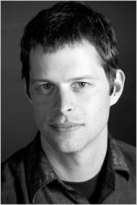

 WORD is excited to welcome Joanna Smith Rakoff to the store tonight, May 19 at 7:30 pm. Joanna will be reading from her debut novel, A Fortunate Age, which details the lives of a group of Oberlin graduates whose ambitions and friendships threaten to unravel as they chase their dreams and build their lives in Brooklyn during the late 1990s. Jami Attenberg, author of The Kept Man will interview Joanna about the new book.
WORD is excited to welcome Joanna Smith Rakoff to the store tonight, May 19 at 7:30 pm. Joanna will be reading from her debut novel, A Fortunate Age, which details the lives of a group of Oberlin graduates whose ambitions and friendships threaten to unravel as they chase their dreams and build their lives in Brooklyn during the late 1990s. Jami Attenberg, author of The Kept Man will interview Joanna about the new book.
 This Wednesday night, we will host our next Indie Press Night with with Soft Skull Press. We’ll hear from two writers with books recently published by Soft Skull: Zachary Mexico (
This Wednesday night, we will host our next Indie Press Night with with Soft Skull Press. We’ll hear from two writers with books recently published by Soft Skull: Zachary Mexico (
 Writer and conceptual artist Rick Reid will be appearing at WORD tonight (April 14) at 7:30 pm, for the launch of his new poetry collection
Writer and conceptual artist Rick Reid will be appearing at WORD tonight (April 14) at 7:30 pm, for the launch of his new poetry collection 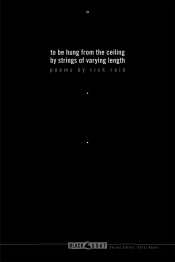

[...] and rock ‘n roll — check it out. If you want to hear Kate read from the book TODAY, stop by WORD at 7:30 pm this evening – in addition to selling copies of this sexy summer book, we’ll be serving up sangria, [...]
[...] It’ll be raining for the next week anyway, so why not brave the G train and the weather tonight, and come out to celebrate the publication of the amazing Kate Christensen’s Trouble, with some sangria and salsa at WORD? [...]
[...] members offer reports from and photos of the event Kate Christensen and I did at WORD last week for her new novel, [...]